 MyDogBreeds
MyDogBreeds Tea Cup Chihuahua is originated from Mexico but Perro de Toro is originated from Spain. Tea Cup Chihuahua may grow 26 cm / 10 inches shorter than Perro de Toro. Tea Cup Chihuahua may weigh 37 kg / 81 pounds lesser than Perro de Toro. Both Tea Cup Chihuahua and Perro de Toro has same life span. Tea Cup Chihuahua may have less litter size than Perro de Toro. Tea Cup Chihuahua requires Moderate maintenance. But Perro de Toro requires Low maintenance
Tea Cup Chihuahua is originated from Mexico but Perro de Toro is originated from Spain. Tea Cup Chihuahua may grow 26 cm / 10 inches shorter than Perro de Toro. Tea Cup Chihuahua may weigh 37 kg / 81 pounds lesser than Perro de Toro. Both Tea Cup Chihuahua and Perro de Toro has same life span. Tea Cup Chihuahua may have less litter size than Perro de Toro. Tea Cup Chihuahua requires Moderate maintenance. But Perro de Toro requires Low maintenance
 Chihuahua is a state in the country of Mexico. From this state, the dog breed Chihuahua and the “teacup, or toy” chihuahua take their name. Interestingly the Chihuahua Club of America maintains that “teacup” Chihuahuas do not exist and that the size differential is normal for the breed. Chihuahuas or their ancestors have been around a very long time, sadly the exact origins of the Chihuahua are lost into the pages of history, but archaeological clues such as wheeled dog toys, art, and pottery link the Chihuahua to Mexico and to the Techichi dog. The Techichi dog at the time of the Spanish Conquistadors was sold for food (not unlike we sell beef or chicken) and also as a companion dog to death. Cortez even mentioned the Techichi dog in a letter sent back to Spain, describing them as being raised for food and sold in the marketplace.
Chihuahua is a state in the country of Mexico. From this state, the dog breed Chihuahua and the “teacup, or toy” chihuahua take their name. Interestingly the Chihuahua Club of America maintains that “teacup” Chihuahuas do not exist and that the size differential is normal for the breed. Chihuahuas or their ancestors have been around a very long time, sadly the exact origins of the Chihuahua are lost into the pages of history, but archaeological clues such as wheeled dog toys, art, and pottery link the Chihuahua to Mexico and to the Techichi dog. The Techichi dog at the time of the Spanish Conquistadors was sold for food (not unlike we sell beef or chicken) and also as a companion dog to death. Cortez even mentioned the Techichi dog in a letter sent back to Spain, describing them as being raised for food and sold in the marketplace.
When a death occurred a dog was chosen as a companion and cremated with the deceased. It was believed that the dog helped the soul of the decedent reach their eternal destination. The Techichi dog from which the modern-day chihuahua likely descended was very plentiful in the central American area that is now the country of Mexico and raised by the ancient Toltecs and later the Aztec people.
Chihuahuas are little dogs and come in a variety of coats, head shapes and even (within the designation small) sizes. The designation “teacup, toy or pocket” while not an official breed name is a useful descriptor, since they are the littlest of an already small breed and these minute pets, as puppies, may fit into a teacup or a pocket.
Fortunately while no longer a food source, the chihuahua is now sought after as a loyal and lively pet and companion.
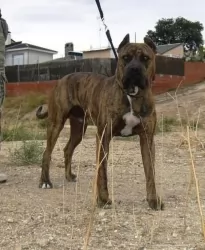 The rare Spanish Perro de Toro seems to have unclear origins, with some saying the dog is a direct descendant of the Toulouse Mastiff, while others say that the dog was developed by crossing the Alano with the Dogue de Bordeaux.
The rare Spanish Perro de Toro seems to have unclear origins, with some saying the dog is a direct descendant of the Toulouse Mastiff, while others say that the dog was developed by crossing the Alano with the Dogue de Bordeaux.
The dog hails from Spain and was once used as a fighting kind of dog but today it is essentially a family pet. The dog is an ancient breed, an ancestor of many of the molosser breeds that are around today.
 Chihuahuas are small. Even the bigger ones are only about six pounds and a “teacup” or “toy” is often three pounds or less. Their bodies are slightly longer than they are tall, but even the tallest are not over nine inches. Chihuahua standing under five inches in height is not uncommon in the “teacup” or smallest of these dogs. They have two different head types and a domed skull. One type of head shape is like a deer while the other is described as an apple-shaped head. The apple-shaped heads are more popular than the deer shaped heads, although sometimes in the “teacup” especially the soft spot fails to close at maturity when growth is complete and the bones should knit, therefore leaving a soft spot in their skull – this is called a molera.
Chihuahuas are small. Even the bigger ones are only about six pounds and a “teacup” or “toy” is often three pounds or less. Their bodies are slightly longer than they are tall, but even the tallest are not over nine inches. Chihuahua standing under five inches in height is not uncommon in the “teacup” or smallest of these dogs. They have two different head types and a domed skull. One type of head shape is like a deer while the other is described as an apple-shaped head. The apple-shaped heads are more popular than the deer shaped heads, although sometimes in the “teacup” especially the soft spot fails to close at maturity when growth is complete and the bones should knit, therefore leaving a soft spot in their skull – this is called a molera.
Like different shaped heads chihuahua may have long hair or short-haired coats. The short-haired coats are smooth. The Chihuahua coats may be a large variety of colors ranging from black to white, with red, brown, fawn, cream and chocolate and they may be solid-colored, spotted or sabled. Personal preference is the determining factor on the type of coat a pet Chihuahua has since the breed does not have a preferred color, pattern, hair length or feel. Their muzzle (nose/mouth combination) is short and pointed. Chihuahua have have naturally erect pointed ears and large round eyes. A Chihuahuas tail is relatively long and mostly either curled up and over the back or carried up.
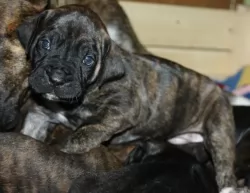 This is a strong, powerful, large breed of dog, making a good watchdog and guardian. He can be anything from 56 to 64cm in height and weigh between 34 and 40kg.
This is a strong, powerful, large breed of dog, making a good watchdog and guardian. He can be anything from 56 to 64cm in height and weigh between 34 and 40kg.
The nose of the dog is broad and black, the ears are set high and droop over slightly,making them floppy ears, but they have always been cropped to stand up erect.
He's a sturdy dog and the tail is fairly thick at the base, tapering to a point. These days it tends to be undocked and left long. The neck is strong and powerful too and the head brachycephalic. The short coat includes colors such as yellow, grey, fawn and red with the black mask.
The Spanish Bulldog looks fairly intimidating and he will certainly need training and socialization if he is to be obedient and well behaved.
He isn’t aggressive but is confident, dominant, fearless, loyal and also loving towards his owner. He is devoted towards his human family and is good with children. Like any mastiff type breed, he will need a firm, kind, consistent, patient owner. This is the kind of owner who will understand this breed type and take time out with him to exercise him and provide him with mental and physical stimulation so as to prevent boredom.
 Children friendliness very interactive with family but has been known to nip at small children and bark, so no not really
Children friendliness very interactive with family but has been known to nip at small children and bark, so no not really
3. Adaptability yes but they are better off in apartments and homes not out in the country where their size makes them targets for predators.
4. Learning ability average ability to learn but Chihuahua can be but stubborn which may impact ability and willingness to learn.
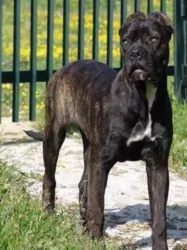 Contrary to what many people think, the temperament of the Perro de Toro is calm and well balanced. This is a reliable, loving, loyal dog who wants to protect his human family.
Contrary to what many people think, the temperament of the Perro de Toro is calm and well balanced. This is a reliable, loving, loyal dog who wants to protect his human family.
He gets on well with children and with pets in the home and when trained and socialized, this intelligent dog is well mannered, obedient and sometimes even submissive.
True, the Perro de Toro has a history of being involved in all kinds of things, from hunting to fighting and also being a working dog, but he is now waiting to show you what a splendid pet he can be if he is raised by the right kind of people.
 Chihuahuas live on average fourteen to eighteen years. There are some issues that may cause concern or lower life expectancy.]
Chihuahuas live on average fourteen to eighteen years. There are some issues that may cause concern or lower life expectancy.]
• Hypoglycemia (low blood sugar) is something to watch for. Low blood sugar can cause death in just a few hours but when caught is very easily treated. Some of the symptoms are being uncoordinated when walking, acting sleepy or lethargic, unfocused sight, fainting, having a seizure or having spasms in the muscles of the neck. First aid can right this condition with a sweet supplement like corn syrup, or honey. This is more common in puppies, but the teacup chihuahuas are susceptible.
• Hydrocephalus (water on the brain) can affect many toy dog breeds. The puppy or dog will appear to have an oversized head, and be slow (display lethargy) and grow slower than its littermates.
• Pulmonic stenosis (a heart condition) occurs when the right ventricle is impeded. Teacup Chihuahuas are also susceptible to heart murmurs.
• Collapsed trachea this occurs when the cartilaginous rings in a Chihuahua do not form completely or weaken. This can be hereditary or an acquired condition and occurs in other small breeds of dog.
• Molera – where after finishing growth a soft spot remains in the skull and the bones do not knit. As a puppy, the owner must remain vigilant about head injuries.
• Obesity (overweight). Most of the time this is a result of the Teacup Chihuahua being overfed. Obesity can contribute to a shortened lifespan and chronic bronchitis.
• Cold susceptibility. Cold weather can cause Teacup Chihuahuas to shiver or tremble when exposed and during cold temperatures, the dogs may need to wear a sweater and boots outside and cuddle with their owners under blankets or bask in the sun to stay warm.
• Infected or injured eyes. Due to the prominent eyes, exposure to irritants such as dust, allergens, or dry air can cause the dog to develop this beginning with watering eyes.
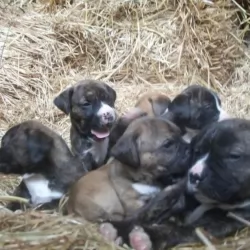 This is a dog breed that is fit and healthy, but to keep him that way you want to make sure he has enough exercise, love and nutritious food.
This is a dog breed that is fit and healthy, but to keep him that way you want to make sure he has enough exercise, love and nutritious food.
He is not known to suffer from any particular disease, but even so, it is wise to be aware of some of the common dog illnesses that your dog could pick up so you can get veterinary help for him just as soon as possible.
With cancer, cells grow rapidly and invade tissue. Dogs can get any of the many cancers there are. Both hereditary and environmental factors can contribute to the development of cancer in canines. Cancer can show up as lumps, swelling, sores that won’t heal, weight loss and difficulty with breathing.
Heartworms are transmitted from one animal to the next by mosquitoes. These worms live in the heart and pulmonary arteries of an infected animal, travelling through the bloodstream and causing havoc. Heartworm is dangerous and can actually be life threatening. Symptoms include coughing, vomiting, battling to breathe and weight loss.
This is a viral disease that can strike terror in anybody who has seen an animal with rabies. It affects the brain and spinal cord of your dog. It is preventable through means of a vaccine. Once symptoms appear, it is a disease which is nearly always fatal.
 1. Feeding the Puppies. Puppies should be fed four times a day. Underfeeding can cause the issues of low blood sugar and overfeeding can result in obesity increasing the risk of other health complications.
1. Feeding the Puppies. Puppies should be fed four times a day. Underfeeding can cause the issues of low blood sugar and overfeeding can result in obesity increasing the risk of other health complications.
2. Feeding the Adult. Adult teacups are also vulnerable to hypoglycemia and obesity. Of course, the low blood sugar will be much more acute than obesity and need prompt care if it occurs. Adult teacups should be fed twice a day.
3. Points for Good Health. The chihuahua generally exhibits more vigor and endurance than pet owners expect from such a small breed of dog.
4. Games and Exercise for Teacup Chihuahua. Go ahead and run and play but remember even with the unexpected stamina and endurance this is a very small dog, small legs, using discernment, judgment, and restraint so the games and exercise is fun and builds health and is a special bonding time, without jeopardizing the sugar levels or causing exhaustion or misery.
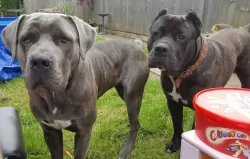 If they are not being used as working dogs, they are family pets, and you need to give them a lot of daily exercise. You will need to give him some walks or hikes and allow him a good run in the country.
If they are not being used as working dogs, they are family pets, and you need to give them a lot of daily exercise. You will need to give him some walks or hikes and allow him a good run in the country.
The Perro de Toro is a short haired dog, and as a moderate shedder, he isn’t going to require too much grooming. A brushing twice a week will help get rid of his hair.
When brushing him, turn it into a bit of a grooming session and check inside his ears, look at his eyes and try to look inside his mouth. He can’t tell you if he has terrible toothache from a rotting tooth and he will rely on you to check his teeth.
Mastiff type dogs need a wholesome diet to remain strong and active. If you are going to feed your pet one of the commercially manufactured dog foods, make sure it is one of the top quality ones.
Avoid the ones that use lots of colorants, preservatives and unhealthy fillers as these can make your dog sick. Try and give him some home-made food which can be added into his dry kibble occasionally.
Boiled chicken, brown rice or pasta and some vegetables such as carrots, sweet potato and spinach chopped up will be excellent for him and will ensure he doesn’t battle with digestive upsets. If you can, every now and then try to include some raw meat for the benefit and health of your pet. Never leave him without a bowl of fresh, cool water.